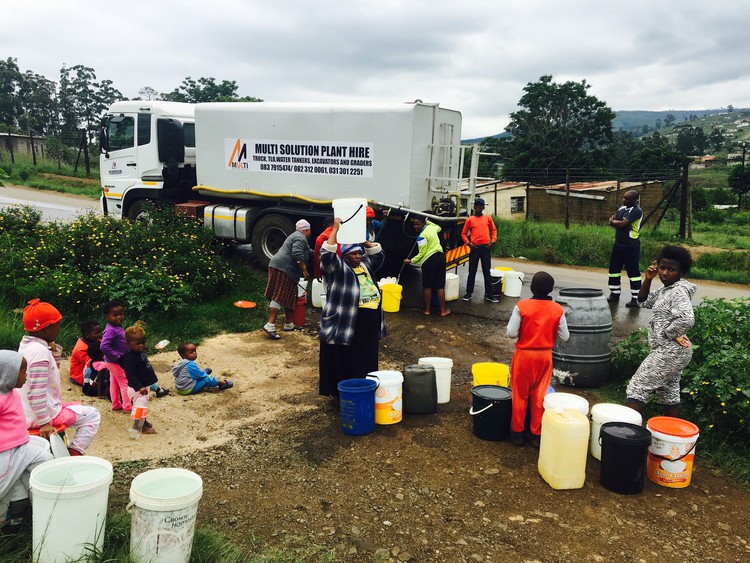KZN town without water for three years
But there’s water for the mayor’s imbizo, say residents
Communal taps in Willowfontein south-west of Pietermaritzburg, have been dry for three years. Residents are dependent on tankers that deliver water once a week. Some people use dirty water from the Zikizi River. Some have dug boreholes to supply their homes.
The locations affected are kwaPhupha, Tomu, Right, Estobhini Esikhulu, Khuzwayo, Ezakheni, Bulwer, Soweto, and Manyinyisa. The area, which is also known as Wilgefontein and Willowfountain, has a population of over 11,000 people in the 2011 census.
Msunduzi municipality acting manager Siyabonga Hlongwa says because of the drought and the level of the Albert Falls dam, which services Pietermaritzburg and Durban, water pressure has been reduced. As a result, Willowfontein, which is built on a hill, has to go without water. Instead, six water tankers are servicing the area, he says.
Umngeni Water is the state-owned company responsible for supplying water to the area. The company did not answer the phone when we tried to get comment.
Nonhle Zondo is a resident of Soweto location. Her 60-year-old mother usually misses the water tanker because she can hardly walk. She says the water tanker does not come every week. “I’m always at work and the children are at school. During the day my mother stays at home. She is sick and she takes medication. When the water tanker comes she misses it. We ask for water from the neighbours who made it to the truck.”
Zondo shares the suspicions she and other residents have. She alleges that the water truck sometimes bypasses houses, going straight to those who have paid the drivers to fill up their personal water tanks. She is also sceptical about why there is no piped water, and claims the municipality is controlling the supply. She says during municipal and ANC events water is available. “Last year during an imbizo by the mayor there was water. Water was running smoothly from the taps. When he finished his imbizo we went back to the suffering. They control our water and we are aware of that,” says Zondo.
Martha Mlambo lives with her bedridden son. She says it’s very difficult for those who take care of sick people to deal with the water restrictions. “The water tanker restricts us with the containers. Sometimes we are only allowed to fill 20 litres, depending on the mood of the driver. Usually when [the truck] comes no one is at home. We go to the Zikizi River and fetch dirty water. It’s a bit far but it is the only choice,” she says.
Mlambo also says water runs smoothly during political events. “Once they start campaigning for next year’s elections this will be over. They will even fix our taps. Next year water will be running in all the communal taps,” says Mlambo.
But ward councillor Thabiso Molefe tells GroundUp that using water tankers is not a choice. “We use them because we have a challenge,” he says.
Molefe says that the location of the area is responsible for the problem. Low pressure means water can’t get up the hill. “Locations that are at the top like kwaPhupha are the most affected. … I have conducted meetings and explained to the community. The 15% water pressure reduction from Umgeni water is the cause of the shortage.“
Senzo Gama from kwaPhupha says residents hire vans to fetch water for them. “We pay R10 for 20 litre containers. People are making money out of misery. There is nothing we can do; we have to pay. Water tankers are not reliable. We don’t know which day they will come. We spot them from other locations. That is how we know they are in the area,” he says.
During a visit to the area GroundUp spotted three water tankers in kwaPhupha location, with the branding of a company called Multi Solution Trading. One resident told us all her containers were empty. She says the tanker delivered water a week ago. “The washing and dishes have piled up already. Four of my grandchildren have been sharing bathing water for three days. We kept the water in a basin. It changed colour to brown but it was the only way.”
Simphiwe Mzimela, the director of Multi Solution Trading, says he received a report of a truck driver receiving a bribe to preferentially treat a resident but the driver wasn’t from his company. He says several companies deliver water to the area. We asked an employee at the company for a timetable of when the trucks deliver but she told us it’s the council’s job to supply that.
Molefe says the council has added water tankers and reservoirs to alleviate the problem. He says two of the reservoirs are already connected in the system. But he admits this has not made much difference.
Section 184 of the Constitution tasks the Human Rights Commission with once yearly getting the state to provide it with a progress report on realising the right to water. So we tried to find out if it’s aware of the problem in Willowfontein. But the Chapter 9 institution failed to respond to our emails.
Support independent journalism
Donate using Payfast

Next: Maitland slumlord forced to fix up property
Previous: The Khayelitsha families who have to beg neighbours for toilets and electricity
© 2018 GroundUp. 
This article is licensed under a Creative Commons Attribution-NoDerivatives 4.0 International License.
You may republish this article, so long as you credit the authors and GroundUp, and do not change the text. Please include a link back to the original article.

